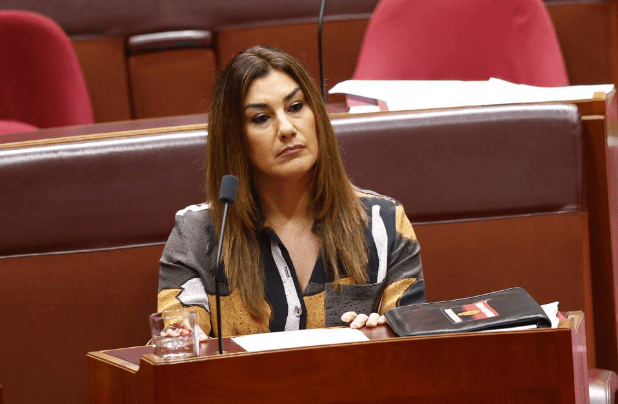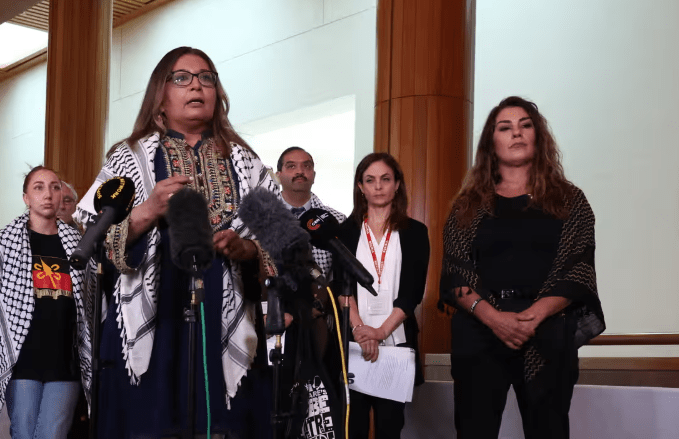Senator Lidia Thorpe has hit back at Labor and the Coalition as they prepare to pass a censure motion against her following her protest against King Charles III last month, accusing them of ignoring First Nations justice to defend the monarchy.
Thorpe’s protest and subsequent condemnation by the major parties come at a time when Australian sentiment is increasingly shifting away from the monarchy and towards republicanism. Prime Minister Anthony Albanese, who is a lifelong republican, reflects a broader movement questioning the relevance of the Crown in modern Australia.
In an era of political conformity, Thorpe’s bold protest against King Charles III on October 21 during the royal Australian tour stands as a profound act of resistance, challenging the Australian political establishment and the lingering vestiges of colonial rule.
Thorpe, an independent Senator and proud Gunnai, Gunditjmara, and Djab Wurrung woman, is no stranger to controversy. Yet her protest, coupled with the looming censure motion, highlights a deeper conflict: the battle between truth-telling and the suppression of First Nations voices.
Thorpe’s unyielding commitment to justice has sparked outrage among the political elite but has galvanised supporters of First Nations sovereignty. “This motion shows where the major parties’ priorities lie. They don’t stand with First Peoples in this country. They stand against justice for our people, preferring instead to defend a foreign king, rather than listen to the truth,” Thorpe said on Monday. Her words expose a stark contrast between the symbolic reverence for the monarchy and the realities faced by Indigenous Australians.

A Reckoning with Colonial History
Thorpe’s protest against King Charles III was not a mere act of defiance but a call for accountability. She highlighted the Crown’s historical crimes against Indigenous Australians, labelling them as “war crimes, crimes against humanity, and failure to prevent genocide.” These statements reflect a growing global movement of Indigenous peoples rejecting colonial legacies.
From the Kanak people resisting French state violence to Samoan calls for accountability during King Charles’ visit, Thorpe’s actions align with a broader Indigenous solidarity. “The era of silence is over, truth-telling is here, and the power of First Peoples’ solidarity will not be denied,” she affirmed.
Australia’s ongoing struggles with Indigenous incarceration rates, systemic injustices, and deaths in custody lend weight to Thorpe’s critique. Since her parliamentary protest, three more First Nations people have died in custody, with 22 deaths recorded over the past 11 months. These tragedies, she argues, reflect a colonial system still actively harming First Peoples.
Silence Versus Sovereignty
Thorpe’s protest has intensified calls for a Treaty—a step towards recognising the sovereignty of Australia’s First Nations and addressing historical injustices. “I am a sovereign Gunnai, Gunditjmara, and Djab Wurrung woman. My loyalty lies with my people, with justice, not with a government or a crown that has systematically worked to erase us,” Thorpe said. Her unwavering stance challenges not just the monarchy but the bipartisan political establishment that seeks to censure her.
The censure motion, supported by Labor and the Coalition, reveals a troubling willingness to suppress dissenting voices. In Thorpe’s words, “They want me to kneel, to be silent, to disappear.” Yet her refusal to bow underscores her resilience.
Beyond Protest: A Call for Change
Thorpe’s fight is not merely about symbolic protests but tangible change. She demands accountability for systemic failures, from the deaths of Indigenous children in care to draconian laws targeting young First Nations children in Queensland and the Northern Territory. Her call for a Treaty seeks to pave the way for healing and unity.
For Thorpe, the censure motion is another opportunity to amplify her demands for justice. “Today I am reiterating my calls for justice, an end to the ongoing incarceration, kidnapping, and genocide of First Peoples. It’s time for Treaty so we can live in peace and come together as a nation,” she asserted.
A Voice Unwavering
Thorpe’s protest against King Charles III is a watershed moment in Australia’s reckoning with its colonial past. By defying the political establishment and speaking out against systemic injustices, Thorpe embodies the resilience of First Nations peoples fighting for recognition, reparations, and justice.
Her actions come as a growing number of Australians question the nation’s ties to the monarchy. With the Prime Minister openly backing a republic and public sentiment increasingly moving in favour of self-determination, Thorpe’s voice adds to a chorus demanding systemic change.
In her words, “The truth is, this colony is built on stolen land, stolen wealth, and stolen lives.” As calls for Treaty grow louder, Thorpe’s voice remains a powerful reminder that silence is not an option in the fight for justice.

